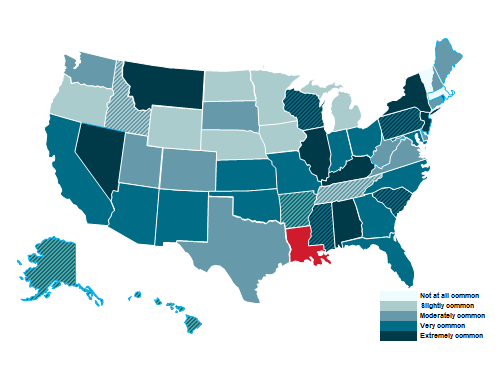Corruption, illegal and legal, seen as a big problem in Southern states

This map shows reporters' perception of legal corruption in state legislatures; Louisiana appears in red because no reporters there responded to the survey. (Map from "Measuring Illegal and Legal Corruption in American States: Some Results from the Edmond J. Safra Center for Ethics Corruption in America Survey.")
How do we measure corruption in government -- something that by its very nature involves secrecy?
The most common approach involves using data from the U.S. Department of Justice's Public Integrity Section on corruption convictions. However, there are problems with that method. For one thing, the data capture only federal corruption convictions, which in turn are related to prosecutorial resources in any given state. In addition, partisan bias in corruption prosecutions is a very real possibility.
A new study by two fellows at the Edmond J. Safra Center for Ethics at Harvard University takes a different approach focused on the perception of corruption. The researchers -- Oghuzan Dincer of Illinois State University and Michael Johnston of Colgate University -- surveyed almost 1,000 news reporters covering state politics and investigative reporters covering corruption-related issues. They got a total of 280 responses.
There are limitations to this data, too: In some states including Arkansas and South Carolina, only a small number of reporters responded. And no one at all responded from Louisiana, which has long been plagued with serious political corruption.
However, the Harvard study went beyond much research on political corruption by considering both illegal corruption, defined as "private gains in the form of cash or gifts by a government official, in exchange for providing specific benefits to private individuals or groups," and legal corruption, defined as "the political gains in the form of campaign contributions or endorsements by a government official, in exchange for providing specific benefits to private individuals or groups, be it by explicit or implicit understanding."
It also looked at perceptions of corruption by branch of government -- executive, legislative, and judicial.
Among the findings:
* Illegal corruption in government is not perceived to be "extremely common" in any state. However, it is thought to be "moderately common" and/or "very common" in both the executive and legislative branches in a significant number of states, including Florida and Texas. Idaho, the Dakotas and most of the New England states are perceived to be the least corrupt.
* Illegal corruption in the executive branch is perceived to be somewhere between "moderately common" and "very common" in Georgia and Kentucky as well as Utah.
* Illegal corruption in state legislatures is generally thought to be more common than in the executive branch. In fact, there are 10 states where illegal corruption in state legislatures is perceived to be "very common"; these include the Southern states of Alabama, Florida, and Kentucky.
* Illegal corruption in the judiciary is thought to be uncommon in most states. But it's perceived as "slightly common" in 16 states including the Southern states of Alabama, Arkansas, Georgia, Kentucky, Mississippi, Tennessee, Texas, and West Virginia.
* Legal corruption is thought to be more common than the illegal variety in all branches of government, and is perceived as common in all three branches of government in Kentucky and Mississippi as well as Illinois and New Mexico.
* Both illegal and legal corruption in the executive branch is perceived to be "very common" or "extremely common" in Georgia, Kentucky, and New Jersey. But in seven states including North Carolina and South Carolina, illegal corruption is thought to be "slightly" or "not at all common" while legal corruption is perceived as "very" or "extremely common."
* "Legal corruption in the legislative branch is particularly worrying in almost all states," the authors write. North Carolina is among the five states where the legislative branch is thought to suffer only from legal corruption, while both legal and illegal corruption is perceived as a problem for lawmakers in a dozen states, including Alabama and Kentucky.
* Legal corruption in the judiciary is perceived as "moderately common" in seven states including Alabama, Arkansas, Kentucky, and Mississippi.
* Overall, the 13 states perceived as having the most illegal corruption including five in the South: Kentucky, Alabama, Georgia, Florida, and Texas. None of the states with the least perception of illegal corruption are in the South.
* Of the 11 states thought to have the most legal corruption, four are in the South: Kentucky, Mississippi, Alabama, and Georgia. Of the dozen states perceived to have the least legal corruption, only one is in the South -- Tennessee.
"Kentucky is not only perceived to be illegally corrupt but also legally corrupt," the authors conclude. "With respect to legal corruption, Kentucky is the most corrupt state followed by Illinois and Nevada while Massachusetts is the least corrupt state followed Michigan, Oregon, and Vermont."
Another study released earlier this year also found serious problems with corruption in Kentucky and in the other Southern states of Tennessee, Louisiana, Mississippi, Alabama, and Florida, as well as in the Pennsylvania, Illinois, South Dakota, and Alaska. That study calculated what corruption costs state taxpayers, arriving at an average annual "corruption gap" per capita of $1,308.
Read a blog post about the new Harvard study by its authors here.
Tags
Sue Sturgis
Sue is the former editorial director of Facing South and the Institute for Southern Studies.
